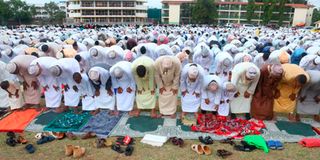Muslims will ‘out-rich’ Christians

Mulsim faithful during Idd-ul-Adha prayers at Ronald Ngala Grounds in Mombasa.
An average week in Kenya is pretty much your average week in most of Africa. There will be a new story—or a recap—of yet another property developer who fleeced the folks who invested in his scheme.
There will be a story of a Sacco somewhere where the leaders have robbed savers. There will be the prophet who preyed on his followers’ wives or relieved them of their land with the promise of heavenly gifts that didn’t arrive.
And there is, of course, the other type of prophet who uses weird and extreme methods to guide the flock to heaven’s gate—making them urinate on stage and drink the pee; swallow Jik bleach; remove their underwear so the spirit can enter them without hindrance; and then offer their breasts to the man of God to squeeze and chase out the demons hiding there.
And in recent times, there has been an explosion in betting. There are tales of spectacular wins but these tend to be few and far between. We mostly hear of devastating losses; school fees lost on the tables; homes sold and lost to fund betting habits; and once-prosperous families ruined by the patriarch’s losing streak.
There was a time the main predator in Africa was corrupt governments. These days, at the retail level, governments have serious competition in plundering the people.
The fellows robbing the wananchi as much, or more, are the army of fraudsters and religious people promising them miracles and instant prosperity on earth and a VIP seat in heaven after they die.
The average African will return home lighter in their pocket than when they left in the morning; they will have less dignity, having lost quite a bit of self-esteem drinking urine in church or being urinated upon by the pastor to save their souls.
If one shifts the gaze from the dramatic headlines, beneath them one finds very gendered forms of exploitation and signs that point to a potentially disastrous future for African Christian societies—and a triumph of its Islamic communities.
First, there are far more male miracle-promising pastors than female ones. And most of the victims of the charlatans are mostly women. You will read 15 stories of a woman who gave up her apartment to her pastor after he promised to help her bear twins before you read one of a man who was conned off his car or goats.
If you search social media and the internet over the past 15 years, you will find hundreds of videos of African pastors telling women during prayer to cast away their underwear or to remove their bras so they can rub ‘holy oil’ on their breasts, but not one of a charismatic female bishop asking the men in her church to drop their trousers so she can let in the Holy Spirit through their nether bits.
In the militant versions of Islam, the male martyrs who die as suicide bombers against some infidels are supposedly rewarded 72 young virgins in heaven. The female martyrs don’t get an equal supply of unspoilt young men. Whichever way you cut it, the women are short-changed. For Christian women, they suffer the deleterious economic effect of patriarchy, male con artists and the predation of a male-dominated religiocracy.
No excesses
But there is an upside if you are a Muslim. Islam’s diktats against usury, idolatry, extravagance and waste have somewhat insulated many Muslims against these excesses. There are no 24-hour mosque prayers, unlike in some independent Christian churches. Imams don’t walk around the mosque five times in a prayer session, basket in hand, shaking down the faithful for all their week’s earnings.
There are no Imams holding weekly miracle crusaders, selling access to God for $500 a pop, or taking widows’ homes in exchange for finding husbands for them. And Muslims gamble less. In bed early and undistracted by 24-hour prayers, they wake up more rested and alert than the “saved” Christians.
Because the sheikhs and Imams don’t fleece them of all their pennies, Muslims have more money left to spend and invest in productive things. The business success of the Somalis in East Africa, the Horn and the diaspora of recent years could partly be because the overwhelming majority of them are Muslim. It is the benefit of the combination of Islamic abstemiousness and highly networked Somali societies.
All this presents new policy challenges for those working to grow economies and create prosperity. How do you deal with extreme independent religion as economic sabotage? How do you create regulations against property con men when they emerge only after people invest in their firms? You can’t deny a business licence to people because they “look like thieves”.
The good news in all this is that being conned by scammers says something admirable about the victims: It shows they had the ambition to get a better life and to make a profit. Even the flock that the crooked pastor robs is seeking salvation and trying to avoid hell after death.
Mr Onyango-Obbo is a journalist, writer and curator of the “Wall of Great Africans”. @cobbo3





